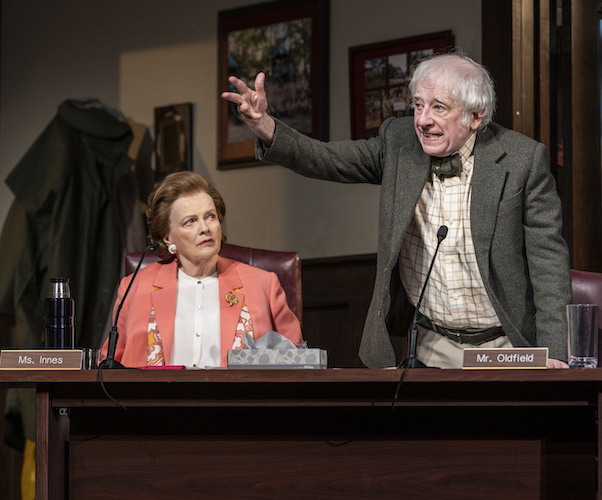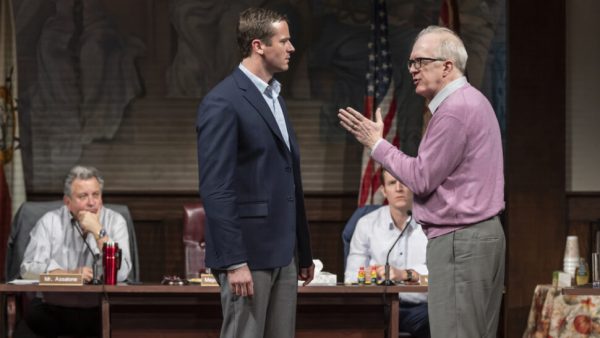Theater Review: “The Minutes” on Broadway Beguiles and Befuddles
By Christopher Caggiano
Pulitzer Prize-winner Tracy Letts’s new Broadway play features an intriguing premise and a shocking denouement.
The Minutes by Tracy Letts. Directed by Anna D. Shapiro. At Studio 54, 254 West 54 Street (between Broadway & 8th Avenue), NYC.

Blair Brown and Austin Pendleton in The Minutes. Photo: Michael Brosilow
When I’ve taught courses in arts criticism, I’ve often recommended that students start crafting their reviews around the feeling that the show or book or movie left them with. I would exhort students to then think about where that reaction came from and start building their case for or against the work that they’re evaluating based on that feeling.
I thought about that exhortation immediately after watching The Minutes, the new Broadway play from Pulitzer-winner Tracy Letts. And the feeling that came upon me after the final minutes of the play was … befuddlement.
I had greatly enjoyed Letts’s Pulitzer Prize-winner, August: Osage County, which remains one of my favorite nights in the theater. In August, Letts was able to mix horrifying proceedings and reprehensible people into an intoxicating concoction that belied its prodigious three-hour length. I also genuinely appreciated Letts’s 2019 play Linda Vista, a compelling character study centered around Ian Barford’s intensely human performance as a sad man frustrated with his own contrary nature.
Advance word about the 2017 Chicago production of The Minutes had been strong. However, I had to wait to experience the Steppenwolf Theater Company’s staging of the play when, in the spring of 2020, the Broadway run suddenly shut down in previews because of the Covid pandemic. But I saw The Minutes when it finally opened on Broadway earlier this month.
I’m not entirely sure what I was expecting, but The Minutes certainly wasn’t it. The script starts off as a slice-of-life play, thoroughly mundane and expository, the action dry and workaday as its title. But, by the end of the evening, chances are the unsettling shift in tone and style will either leave you overpowered — or scratching your head, as I was. It didn’t take long to figure out what the jarring finale was meant to convey (more on that later), but the experience was thoroughly unsettling.
The Minutes takes place mostly in real time — with one significant flashback — at the weekly meeting of a town council in Big Cherry, which one of the characters describes as “a wet sock of a town.” For the first half hour or so, the dialogue concerns the quotidian minutiae of small town life: stolen bicycles, parking spaces, a proposed redesign of a fountain in the town center. Petty rivalries surface and simmer. We get repeated hints of some intrigue concerning an absent council member and the missing minutes from the previous meeting.
About halfway through, the events of The Minutes take a turn for the quizzical when the council members rise to reenact the story of one of the town’s seminal events, the one that the aforementioned fountain commemorates.
We experience the story through the eyes of Mr. Peel, played by the eminently likable Noah Reid of Schitt’s Creek fame. Peel is a new council member who missed the previous week’s meeting to attend his mother’s funeral. He is curious about the absence of both the minutes from that meeting and the mysteriously AWOL council member, Mr. Carp.
Mr. Peel’s inquiries as to the whereabouts of both are met with impatience and veiled hostility from his fellow council members and the mayor of the town, played with restraint by the playwright. The cast also features welcome and familiar faces from the Steppenwolf ensemble, including Ian Barford and Sally Murphy, as well as Broadway vets Austin Pendleton and Blair Brown.

Armie Hammer and Tracy Letts in The Minutes. Photo: Michael Brosilow
There’s a lot of humor in The Minutes until Letts pulls the rug out from under us, a contrast that is doubtless deliberate on the dramatist’s part: the micro mundanities of small-town life followed by a macro sucker punch.
Thematically, The Minutes explores the self-delusions that we as Americans cling to in order to survive, to protect our families, and to enjoy a comfortable existence despite the ruthless acts our ancestors perpetrated to secure that comfortable existence. The play confronts our smug complacency about a bowdlerized history of America. History has been whitewashed, and we don’t want to confront the hard truths about our past. We’re comfortable with cozy half-truths and outright lies about how the country was founded — stolen, really. The show raises weighty questions about who writes history, which stories get told, and whose tragedy gets conveniently — necessarily? — forgotten.
As I sat watching the play, I kept thinking about “The Big Lie.” The same people who are perpetuating that treacherous falsehood are the ones who don’t want our country’s actual past taught in our schools, because the truth makes us look savage, heartless, and mercenary. Which, of course, we are.
The lack of movement and action for most of the play seem to be part of director Anna D. Shapiro’s strategy, a calculated contrast that sets up the pivotal moments when the council, and the cast, are jump-started to generate the production’s climactic moments.
Witnessing the petty idiosyncrasies of the town followed by a discomfiting shock of an ending makes for a rather disorienting experience. As necessary as the end of The Minutes is, that doesn’t make it any less disturbing. There is a certain poetic justice to the finale because it represents one final appropriation. We’ve taken everything from these people, Letts seems to say, even their totems and customs. So the characters here are using those appropriations to celebrate their victory.
The more I thought about the ending, the more I decided that The Minutes really had to end this way. But that doesn’t make it any more pleasant to have experienced it.
Christopher Caggiano is a freelance writer and editor living in Boston. He has written about theater for a variety of outlets, including TheaterMania.com, American Theatre, and Dramatics magazine. He also taught musical-theater history for 16 years and is working on numerous book projects based on his research.

I happened to catch it in one of its final previews when I was down seeing the Holbein show at the Morgan. I felt it was an uneven but worthy attempt to grapple with Trump-era politics, although it’s been a bit overpraised. You’re right that Letts doesn’t nail that hard left into “Lottery” territory – and his superannuated Steppenwolf cast struggles to project physical menace. Hence the pounding sound design, I suppose. The script works best early on, when little seams of unease first begin to splinter the surface of the small-town banter. But Letts, alas, lets some extended schtick take the place of real development, and then he rushes to the finish line – and doesn’t even bother sketching in a credible rationale for the return of Mr. Peel, his ostensible hero, to the savage Caucasian fold. I also felt that the playwright was slightly miscast in his own leading role (I believe in Chicago it went to William Petersen, a better, colder match). Still, at times the script still crackles with angry, disillusioned energy, and given that the theatre is basically dead, maybe we should just be grateful when the corpse twitches a little.